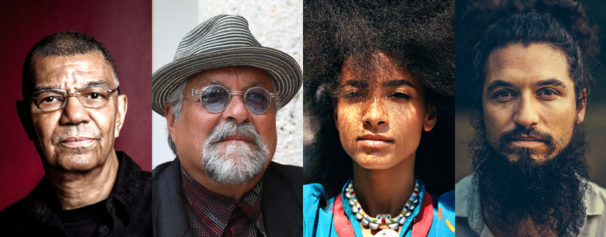
For a jazz super group, the Spring Quartet is something of a phantom. Most Angeleno jazz fans had never heard of the quartet, but they all know the names of saxophonist Joe Lovano, drummer Jack DeJohnette, bassist Esperanza Spalding and pianist Leo Genovese. When the group performed at the John Anson Ford Amphitheatre on Saturday, March 27, few knew that it was a return trip, five years after their earlier Los Angeles appearance. The group only did one tour, and did not record so it only lived in the memory of those who saw them.
Those names, and the reputations attached to them, nearly filled the Ford on a chilly night. It’s an asymmetrical aggregation, with two veterans (Lovano and DeJohnette), a young star (Spalding), and an ascendant young player (Genovese). The drummer announced that all of the material they would play that night was generated by its members. That’s a double-edged sword; audiences get firsthand accounts of the previously unknown, but it requires listeners with a big appetite for the new. They played from written scores, indicating that not all of the music is yet under their fingers. With four compositional viewpoints to account for, there was some common ground. Spacey, rubato solo introductions and interludes often gave way to lightly-swinging sections. The swing seemed to surface most forcefully in Lovano and DeJohnette’s pieces. Lovano’s “Spring Day” became a bounce, which exposed Genevese’s percussive proclivities. Spalding, as well, can channel the swing very quickly and effectively. Listening to her play a strong four-on-the-floor made one wonder how many times Leroy Vinnegar (1928-1999), the master of the walking bass, must have played in this very same setting.
But the written music is only a point of departure, of course. Each of the Spring Quartet players is a game improviser. Geneovese took his first solo (on “Spring Day”) right into the crash-and-burn of Cecil Taylor’s ten-fingered assaults. But on DeJohnette’s “Herbie’s Hands Cocked,” he percolated rhythm with a left hand on the grand piano and his right on an electronic keyboard. Lovano’s new tunes indicate he likes exploring free-time and, give him a place for it, he’ll go operatic and let the tenor soar. DeJohnette, always a titan of touch, played loose but his articulation on the drums was never blurred—no matter the tempo or the dynamic.
It’s ambitious to present a program of new music, where it would have been quite easy to put up points by jamming on an audience favorite. There were some eighth-inning walkouts, but the group admirably stuck to its guns.
The one false note was Spalding’s introduction to her lament, “Works of Art.” She conflated her long, nappy hair with what she calls “public acceptance” — as it relates to the process of grant application. Few young jazz players in recent times have made as big a commercial splash as Spalding. With all due respect, would-be social justice warriors might take up more deserving causes.
Kirk Silsbee publishes promiscuously on rock, jazz and culture.
